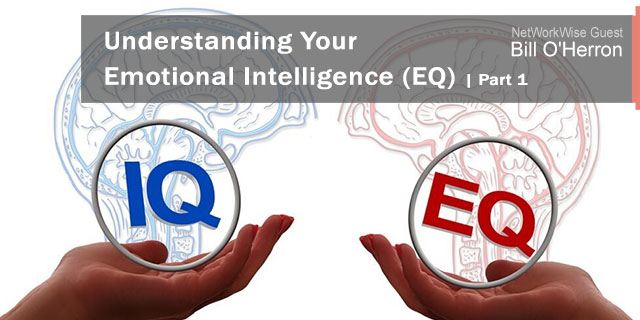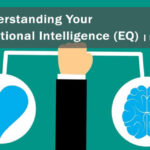This is Part 1 of a guest post by Bill O’Herron LCSW, Director of Capital Markets at Cygnus Capital, a successful alternative asset management firm based in Atlanta, GA
The ability to successfully network, ask for referrals, and develop lasting, relational trust with clients could be three of the most valuable skills for a salesperson.
The way to continually hone and develop these vital capabilities is to fully understand and deepen your emotional intelligence (EQ).
The term and concept of EQ has enjoyed immense popularity, especially since the mid 1990’s after Daniel Goleman published his seminal work Emotional Intelligence. Catchy name I know! I believe though that many people do not fully understand what EQ is, where it comes from, and how to acquire more of it.
The idea of EQ is founded on the timeworn truth that humans, like everything else on the planet, are comprised of two opposing parts, two distinct operating systems and modes of understanding.
The world is built on opposites; night has day, he has she, East has West, etc. For humans, it is reason vs. intuition, logic vs. emotion, and analysis vs. inspiration. These opposing inner experiences and modes of thinking are, naturally, housed in different parts of the body.
The left brain which is the youngest part of our brain system, referred to as the prefrontal cortex, is the home of our cool logic. This is where we analyze using a linear, time-based perspective. This part of our experience filter is pattern-seeking. It hears, sees, or notices something, and looks to fit it into a framework that is familiar. Things always have a beginning and an end from this side’s angle.
This rationalizing side is powerful. Sitting anatomically at the top area of the brain, governing from on high, its job is to take the ideas, inspiration, and desires from our right brain and put them into action in the material world. Our left brain converts what is non-physical, like intuition, into the physical, turning “unknowns into knowns” (Robert Monroe).
This area, logically, is the home base of our Intelligence Quotient (IQ). There is a rub though. Our IQ is fixed. We “do not get smarter learning new facts and IQ is the same at age 15 as it is at 50” (Bradberry, Emotional Intelligence 2.0). In other words, it does not grow or expand.
Einstein commented on the limitations of this practical, intelligent part of us, saying “intuition, not intellect, is the ‘open sesame’ of yourself. Intuition is the father of new knowledge, while empiricism is nothing but an accumulation of old knowledge”.
So, what is the great one Einstein, not Gretzky, referring to when he says intuition?
He is talking about our right brain, the more opaque, perhaps even inexplicable part of our human awareness.
Our instinctual, feeling-based system is warehoused in our limbic or right brain. This emotional center is more complex than our left since it is stored within a network of distinct regions of the body; the primal or reptilian brain center at the base of the skull, the mid-brain where memories live and breathe, the solar plexus where our gut feelings rest, and the heart-brain which is composed of some 40,000 neurons that feel, learn, and remember just like our left brain (www.heartmath.org).
This right brain structure, millions (and millions) of anatomical years older than our left, guides and impels our perceptions and sensibilities about things like friendship, love, life, etc., everything that our left side cannot fully grasp. Intimately connected to our reptilian brain, this part not only controls many of our basic functions like breathing and heart rate, it also has not really changed or evolved.
More importantly, this part operates outside of the confines of linear time. We might see something or hear a song and time might evaporate as childhood memories flood our mind and body. Whether joy, passion, anger, or any inspired emotion in between gets kicked up, our entire person can become overwhelmed.
This is why our right brain arena is often referred to as our unconscious or subconscious, as it operates outside of the linearly framed ‘window’ of our daily adult life.
The science of this unconscious part of self is relatively simple; when something we hear, feel, or just think about triggers an emotional reaction, a bio-electrical charge is generated within these lower brain centers, which in turn releases a hormone called noradrenaline. This powerful neuro-chemical sets off a cascade of more signals to the other parts of the right brain system, as the heart races and our muscles tighten (Ludwig Janus, MD, Echoes from the Womb). All of this stimulation is too strong for the left brain, so it just keeps itself out of the path of the right brainstorms.
The key takeaway from this is that our emotional system can and does take control of the ship away from our rational side when we are filled with feelings.
Our left brain is not only no match for our feelings, but it actually shuts down when the body is in high passion mode. All those biochemical signals literally bypass our thinking system. Some researchers say that 95% of our lives are actually lived unconsciously, that we are constantly reacting to inner and outer stimuli without the necessary restraints of our organizing, intelligent part.
The unruliness, complexity, strength, and timelessness of this emotional operating system are what make us unique though. It is where our true desires are born and gather their fuel from.
It is where the sonar of our gut feelings guides us to charge forward or sit back, pick up the phone or more sheepishly send an email. It is the home to deepest personal history, the myths of our family and ancestors which are still stored as emotion-filled memories.
Robert Monroe, mentioned above, the pioneering author and researcher, summarized the elegance of our emotions when he said, “emotion is key to and driving force underlying every thought and action in human existence” (Far Journeys). Carroll Izard concurs, saying emotions “constitute the primary motivational systems for human behavior…and largely determine the contents and focus of consciousness throughout the life span” (Emotion Theory and Research).
The wonderful challenge though of sales, of our life, inherent within this left-right structure is that our left and right brains need each other, need to be in meaningful and active communication in order for us to really learn and mature.
In fact, the only way to mature is to get these two parts to interact.
If we are too invested in IQ, in the logical elements of our life, we cannot understand the behavior and reactions of others and we can become dismissive of others’ feelings, reactions, and desires.
Empathy and listening are the keys to building trust, and these are not the domain of cool analysis, but the world of heart and intuition.
EQ is a bigger, older, different, and sometimes more remarkable story.









